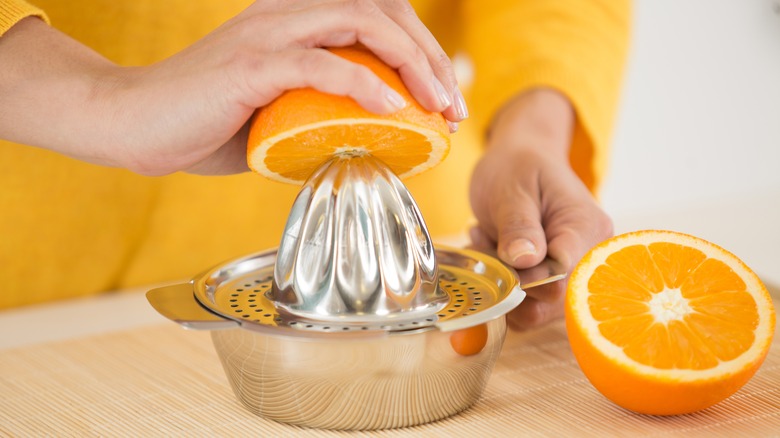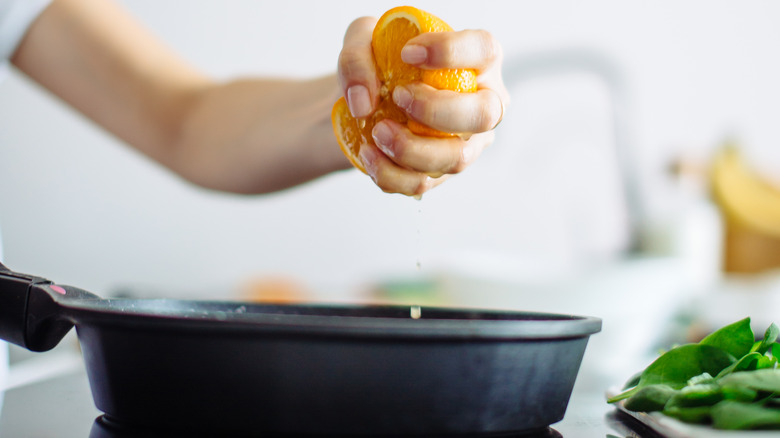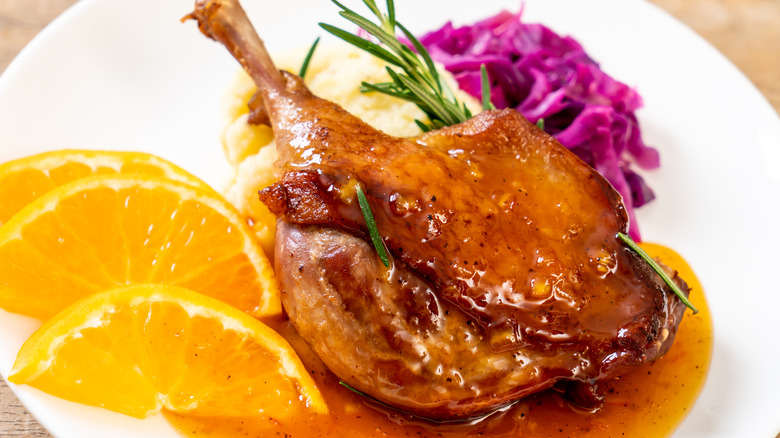Orange Juice Is A Game Changer For Deglazing Pans
The word deglazing might sound like a daunting culinary process. But really, it's a simple technique that can help make incredibly tasty sauces when you're cooking. It refers to the method of adding liquid to the skillet or pot you've been cooking a piece of protein in, in order to release all the little browned bits that tend to stick on the bottom.
Those caramelized bits, also known as fond if you want to get technical, are actually packed with huge amounts of flavor. When loosened by adding some liquid and with a little scraping and stirring, they begin to dissolve in the hot pan as the liquid reduces, forming the basis of a delicious sauce or rich gravy.
Learning how to deglaze a pan can elevate home cooking to a near-restaurant level, and almost any liquid will do (apart from dairy which can split or curdle) — from wine or beer to vinegar or even fruit juice. Depending on the dish, citrus juices (such as those from fragrant oranges) work especially well, adding a unique flavor to the finished meal.
How to deglaze a pan with orange juice
To deglaze a pan, you'll need a skillet that is not non-stick. Because, as obvious as it sounds, if you use a nonstick pan, you won't get any of the little browned bits stuck to the bottom. Rather, stainless steel or cast-iron pans are usually good bets.
Cook your choice of meat to your liking, and after you remove it from the pan, pour off any excess fat. If there is any, as it can give the final sauce a greasy texture. When you add in the orange juice — around a cup is the ideal amount for three to four servings — keep the heat on the stovetop at medium to high and give everything a good stir to free all the caramelized bits. A wooden spoon works great to gently scrape them up.
You can always add a couple of tablespoons of water or stock to loosen the mixture further. And, if the resulting sauce tastes too sweet, try adding a teaspoon of vinegar or lemon juice. You could also add in some aromatics, like fresh herbs or orange zest, if you really want to ramp up the citrus notes. If you want a thicker sauce, whip in some butter to make it extra rich.
Deglazing with orange juice works wonders in many dishes
While wine, beer, or stock all add savory depth to sauces when you happen to deglaze a pan, liquids such as orange juice — even though they are acidic — also add a delicious sweetness, thanks to the sugar content. This can work extremely well with certain meats that pair well with fruity flavors.
Duck goes perfectly with orange, as seen in the classic French dish duck a l'orange. While usually made using a whole duck, it's possible to get similar flavors from a dish that is much faster to prepare, by frying duck breasts in a skillet, and using orange juice to deglaze the pan before adding seasonings to taste.
Pork is another meat which can benefit from the sweet, bright flavor of orange juice. For a quick but tasty dinner, try pan frying a couple of pork chops, then while they're resting, deglaze the pan with a mixture of orange juice, sugar, and Dijon mustard for a quick, tangy glaze.



